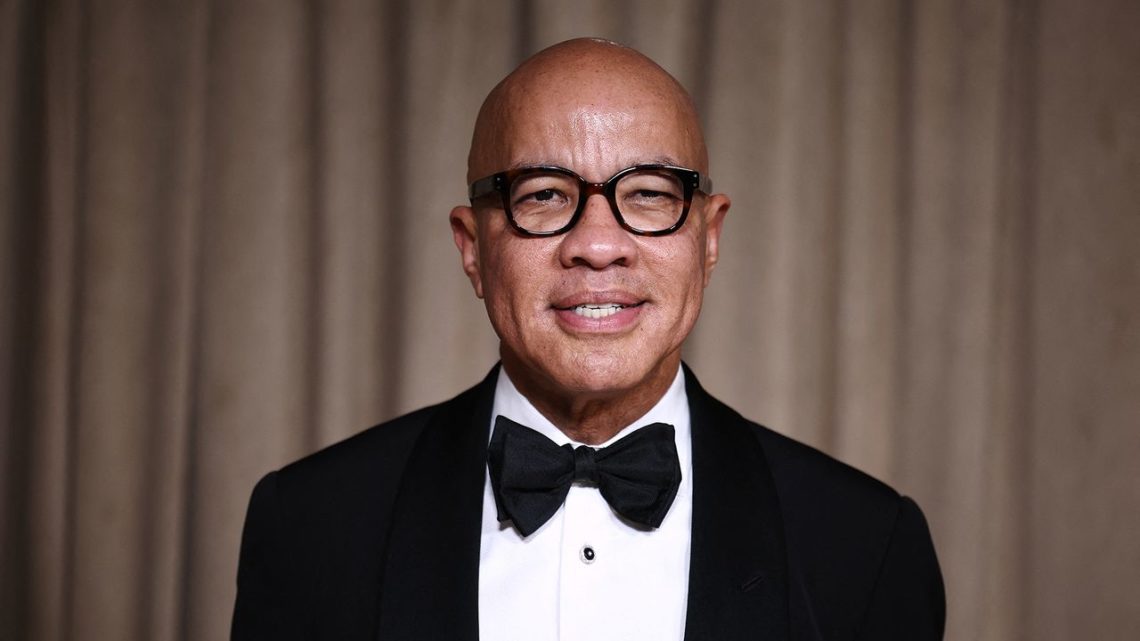Darren Walker was not supposed to run the Ford Foundation. Born to a single mother in Louisiana in 1959, Walker grew up Black and poor in rural Texas. “I think I was always a strange little gay boy,” he says with a laugh. “I was fortunate. My mother gave me unconditional love, and so I never felt out of place or unwelcome.”
Who knew Beula Spencer’s strange little boy would one day become the 10th president of the Ford Foundation, a private philanthropic organization with the goal of advancing human welfare and social change. Founded in 1936 by Edsel and Henry Ford, the Ford Foundation is one of the wealthiest private foundations in the world, with a reported endowment of over $16.8 billion. Since 2013, Walker has overseen the entire operation.
Today, after almost 13 years, is leaving his post. On a Zoom from his home on the east side of Manhattan, Walker chats with Vanity Fair while sitting in his kitchen, intricately decorated with art and photos of Black luminaries like Muhammad Ali and James Baldwin. “I have all sorts of things pinned on it—an inspiration wall,” he says.
Inspiration is a core tenet of Walker’s new book, The Idea of America. Published on September 3 and featuring a foreword by Bill Clinton, the book is a 500-plus page compilation of Walker’s speeches, essays, and musings about the promise and pitfalls of our nation—and how to remain optimistic even in our current political landscape. “I believe in this country because it made my journey possible,” says Walker.
A graduate of the University of Texas’s undergraduate program and law school, Walker says that federally funded social programs like the Pell Grant are responsible for getting him to where he is today. “There were so few barriers to my getting on that mobility escalator,” he says. “I was in the first Head Start program. I went to great public schools. I proudly assert that I have never had a day of private education in my life. That is because my country believed in my potential, and that manifests in the kinds of policies and programs and private philanthropy.”
Walker decided to write his book, which he calls “a love letter to America,” after reflecting on the multitude of essays he’d written and speeches he’d given at both universities and Fortune 500 companies. He quickly realized “how prescient and timely many of them remain,” he says. “I wrote about the growing skepticism of capitalism by younger people. I wrote several about extremism and polarization and how we had been growing intolerant on both sides. On the right and the left, there was less willingness to tolerate, to engage, to even think about building consensus with people who we disagreed with—and how harmful that is for our democracy.”
Walker’s book party, which invited more than 300 luminaries—including Oprah and the Clintons—to his home, occurred less than 24 hours after right-wing influencer Charlie Kirk was assassinated, sparking political unrest. Still, “I will never give up on America. I have a profound and unwavering belief in this country and the ideas that we are rooted in,” says Walker. “We’re in a moment where we desperately need our leaders to bring us together, to return to the principles and frameworks that allowed a group of men in 1776 to come together who had violently different opinions about their idea of America.”
Walker is undeterred by those on the opposite side of the aisle—perhaps like Kirk—who may see him as less than due to his race or sexuality. “I ignore those people, because I don’t believe those people are the majority of this country,” says Walker. “America has always had racists and homophobes, and regrettably, I don’t think we will ever be without. I believe the majority of Americans are not racists, are not homophobes, and want to find common ground.”
As president of The Ford Foundation, Walker sought to create common ground. In that time, he oversaw over $7 billion in grants—helping to resolve bankruptcy in Detroit, saving the Detroit Institute of Arts museum, as well as issuing a $1 billion bond to stabilize nonprofit organizations in the wake of COVID-19. “Most of us don’t live in the black and white binary. We live in the gray space in the middle,” he says. “The gray space is where solutions get created and problems get solved. We have to find ways to say, ‘We’re not going to let the extremes control the narrative.’”
He also refuses to allow the current administration to control the narrative. Although Donald Trump and his colleagues have unraveled and defunded many of the social programs that are near and dear to Walker’s heart, he refuses to be cowed by them. “The work of America is not defined by any one administration,” says Walker. “It’s defined by our commitment, meaning our citizens’ commitment and willingness to engage, to fight for, and to demand the kind of government we want.” To show how unphased he is, Walker refuses to mention the current president by name throughout our interview. When I ask why, he says the following: “I think it’s really easy to get subsumed into this moment and not keep your eye on the prize long term. That’s why.”
And while Trump may be attempting to reshape the Smithsonian and the Kennedy Center in his own image, Walker, for one, is not worried about the future of art. “If you believe in and support artists, there is no reason to be dejected or depressed about the state of things. As long as we invest in the artists, artists will hold the mirror up to us. They will demand that America look at itself,” he says. As president of the Ford Foundation, Walker is particularly proud of how he championed a diverse array of artists like Alma Thomas, Kerry James Marshall, Mark Bradford, Lorna Simpson, and Sanford Biggers, financially supporting their work. “These exhibitions helped to strengthen our understanding of who we are as a people and the breadth of excellence that exists in diverse communities in the arts,” he says. While he’s stepping away from The Ford Foundation, Walker will continue as the president of the National Gallery of Art.
Although things may seem incredibly dark, Walker thinks cynicism is not the best path forward. “Unless we’re willing to understand why compromise is important, why building bridges is important, why community, all of us in community, is important—if we aren’t willing to embrace these ideas which are rooted in our founding documents—then we’re going to hit a wall as a nation,” he says.
Walker comes by his optimism honestly. It helped him through one of his most difficult chapters. “My life changed when I, in 1992, fell in love with this man named David Beitzel—this amazing, brilliant, kind and generous man who told me that he loved me and that he wanted to spend the rest of his life with me,” says Walker, smiling. “We were together 26 years. He came home from a week of skiing in Aspen in January of 2019, and we had a wonderful weekend. And on Sunday morning, the 19th of January, we got out of bed and he said, ‘I’m not feeling well.’” Three hours later, Beitzel died of an aneurysm.
Losing Beitzel was almost insurmountable for Walker. “I had a great grief counselor who helped me understand that because I was so loved by him and because I was loved by him and his family and because I had meaningful work, that the healing process for me would be that I would be okay,” he says. “Meeting David changed my life. David’s dying changed my life. And so now I have to go forward and live a life without David or the Ford Foundation—which I could not have imagined in the past because I always assumed that I would have one or the other with me until my last days. So candidly, it’s slightly terrifying to lean into a future with so many unknowns.”
Not everything in Walker’s future is unknown. He knows that he’s no longer interested in being president or a CEO, and he was recently invited by former president Barack Obama to join the Obama Foundation board. But ultimately, Walker doesn’t know what his next era holds. What Walker does know is that he wants to create a world where stories like his are more common in America. “I’ve lived with privilege and without privilege. and there’s a big difference,” he says. “I want for young people in America to feel the way I felt when I was a boy living in that little shotgun house. I believe that my country was cheering me on.”
More Great Stories From Vanity Fair
-
King Charles Strips His Brother Andrew of “Prince” Title and Royal Housing
-
Cheryl Hines’s MAGA Makeover
-
The Breakup Album That Has Everyone Talking
-
What Really Happened on the Set of Baby Jane?
-
See All the 2025 Gotham Awards Nominations
-
How Mary Shelley Pioneered Polyamory
-
See All The Celebrities (And Their Fashion) At Vogue World: Hollywood
-
The 25 Best Shows on Netflix to Watch This November
-
Charli xcx Enters Her Next Chapter
-
From the Archive: The Hollywood Secret Katharine Hepburn Helped Bury
The post Ford Foundation Visionary Darren Walker Still Believes in America appeared first on Vanity Fair.




